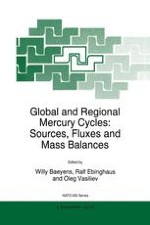1996 | OriginalPaper | Buchkapitel
Sources, Sinks and Biogeochemical Cycling of Mercury in the Ocean
verfasst von : R. P. Mason, W. F. Fitzgerald
Erschienen in: Global and Regional Mercury Cycles: Sources, Fluxes and Mass Balances
Verlag: Springer Netherlands
Enthalten in: Professional Book Archive
Aktivieren Sie unsere intelligente Suche, um passende Fachinhalte oder Patente zu finden.
Wählen Sie Textabschnitte aus um mit Künstlicher Intelligenz passenden Patente zu finden. powered by
Markieren Sie Textabschnitte, um KI-gestützt weitere passende Inhalte zu finden. powered by
A review of the available information on the sources and sinks for oceanic mercury (Hg) illustrates the importance of the ocean in the global Hg cycle. The principal source of oceanic Hg is atmospheric deposition with riverine sources contributing about 10% of the total inputs. The primary loss term is gas evasion at the sea surface. Burial of Hg in ocean sediments is a minor sink (10% or less of the total flux). Mass balance estimates suggest that hydrothermal sources do not contribute significantly to the oceanic Hg pool. Overall, about 11 Mmol/yr is currently being added to (and lost from) the ocean reservoir. Much of this Hg is of anthropogenic origin. Mercury deposited to the ocean is effectively reduced, principally by biologically-mediated processes, to elemental Hg and this leads to a rapid recycling to the atmosphere of much of the deposited Hg. Reactive Hg is converted in deeper ocean waters to methylated Hg species. Methylated Hg species and elemental Hg are important components of the Hg pool and the interconversion between the different Hg forms determines, to a large extent, the fate and transport of Hg in deep ocean waters, and the extent of Hg accumulation in marine food chains.
